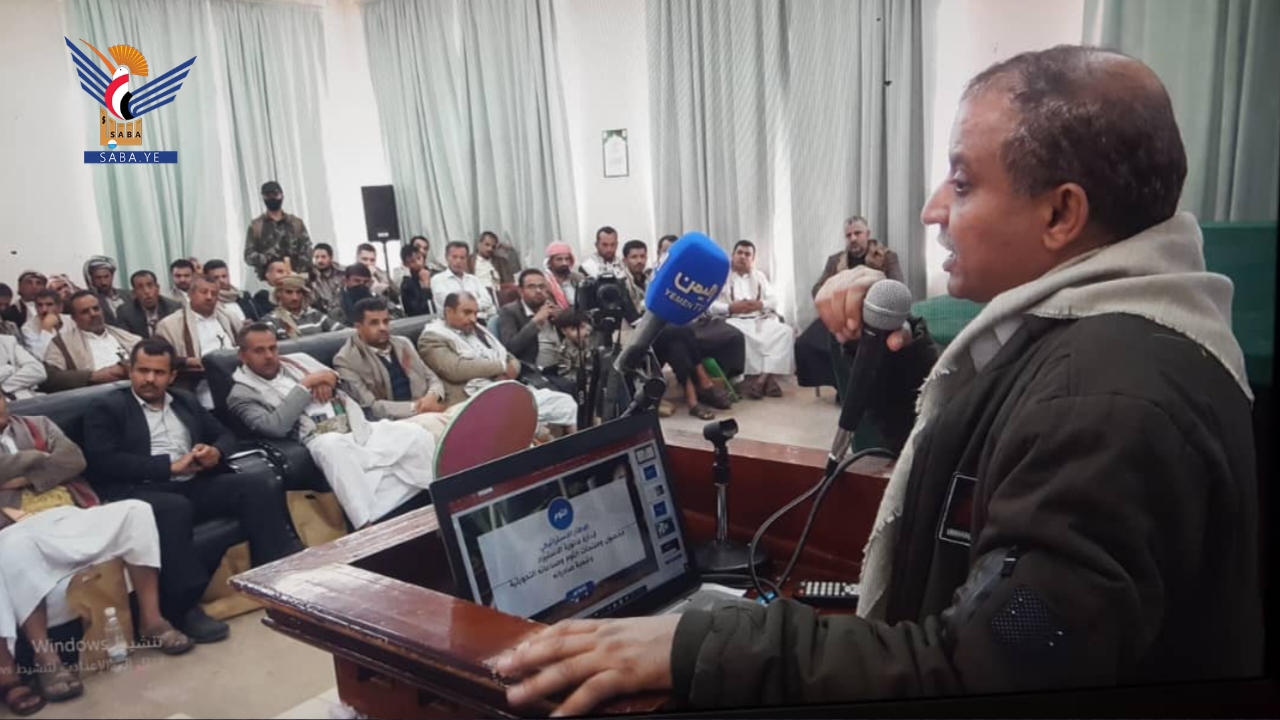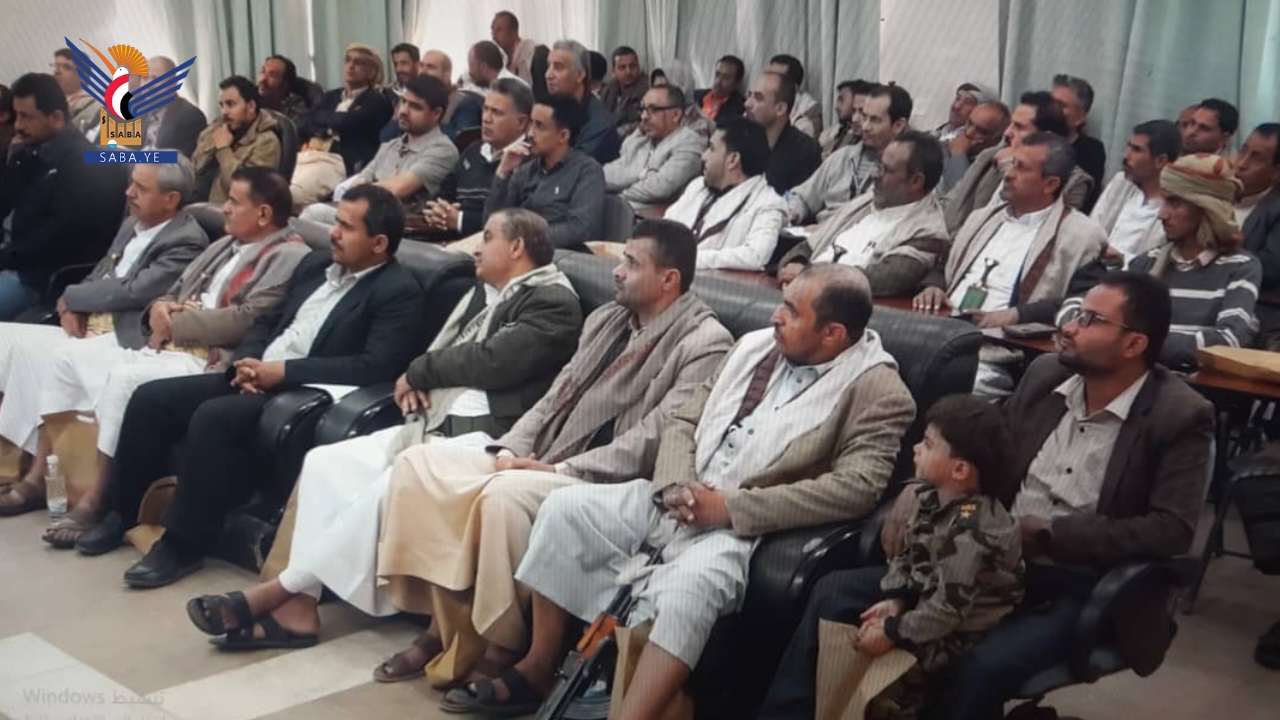
Sana'a - Saba:
A workshop was held on Tuesday in the capital Sana'a to prepare a strategic framework for managing the import bill for orange, garlic and tamarind crops, and concluding contractual farming contracts between agricultural cooperatives, importers, manufacturers and exporters.
The workshop, organized by the Ministry of Agriculture, Fisheries and Water Resources in coordination with the Ministry of Economy, Industry and Investment and the Agricultural Cooperative Union, aimed to reduce the import bill for manufactured orange juices, benefit from the local product and introduce it into the juice processing industry as an alternative to the foreign product, as well as prepare a strategic framework for managing the import bill for garlic and tamarind crops.
In the workshop, Minister of Agriculture, Fisheries and Water Resources Dr. Radwan al-Rubai stressed that contract farming represents a practical and comprehensive solution to achieve sustainable agricultural development and enhance national food security.
He pointed out that contract farming relies on concluding prior contracts between farmers and purchasing entities, such as food manufacturing companies or traders, which provides marketing guarantees to farmers at fixed or agreed prices.
The Minister of Agriculture pointed out that this farming encourages farmers to invest in improving the quality of products, thanks to the technical and technological support often provided by contracting companies, which includes providing improved seeds, fertilizers, and advanced irrigation techniques, which positively reflects on the quality and quantity of production.
He stated that oranges are a crop with high demand locally and internationally, which makes it suitable for implementing the contract farming system, indicating that garlic, which has great nutritional and medicinal value, is one of the crops that can witness significant growth if marketed properly.
He noted that there are promising opportunities to develop tamarind cultivation and increase its exports, especially in light of the increasing demand for it in the food and beverage industries.
Minister al-Rubai stressed the ministry's keenness to support farmers and agricultural institutions in implementing contract farming by providing agricultural guidance and technical support, and its readiness to enhance partnerships between the public and private sectors to facilitate the adoption of this system, in addition to developing the necessary legislation to guarantee the rights of all parties.
He called on the private sector to engage more in contract farming projects, stressing that this cooperation will benefit the national economy as a whole by improving productivity, reducing losses, and enhancing exports of agricultural products.
Acting Chairman of the Agricultural Cooperative Union Mubarak al-Qaili pointed out the importance of contract farming as one of the important and necessary policies for achieving sustainable agricultural development, and its role in linking small farmers through cooperative societies to ensure the marketing of their products, and enhancing opportunities to increase agricultural productivity levels.
In turn, Contract Farming Officer Foud al-Seraji gave an explanatory presentation on the orange product and a presentation on the strategic framework for managing the bill for garlic and tamarind crops.
The workshop was attended by a number of specialists, agricultural engineers, representatives of the private sector, traders, importers, and a number of heads of agricultural societies.
In addition, a number of agreements for contract farming were signed between a number of agricultural cooperatives and importers under the supervision of the two ministries and the Agricultural Cooperative Union.
A workshop was held on Tuesday in the capital Sana'a to prepare a strategic framework for managing the import bill for orange, garlic and tamarind crops, and concluding contractual farming contracts between agricultural cooperatives, importers, manufacturers and exporters.
The workshop, organized by the Ministry of Agriculture, Fisheries and Water Resources in coordination with the Ministry of Economy, Industry and Investment and the Agricultural Cooperative Union, aimed to reduce the import bill for manufactured orange juices, benefit from the local product and introduce it into the juice processing industry as an alternative to the foreign product, as well as prepare a strategic framework for managing the import bill for garlic and tamarind crops.
In the workshop, Minister of Agriculture, Fisheries and Water Resources Dr. Radwan al-Rubai stressed that contract farming represents a practical and comprehensive solution to achieve sustainable agricultural development and enhance national food security.
He pointed out that contract farming relies on concluding prior contracts between farmers and purchasing entities, such as food manufacturing companies or traders, which provides marketing guarantees to farmers at fixed or agreed prices.
The Minister of Agriculture pointed out that this farming encourages farmers to invest in improving the quality of products, thanks to the technical and technological support often provided by contracting companies, which includes providing improved seeds, fertilizers, and advanced irrigation techniques, which positively reflects on the quality and quantity of production.
He stated that oranges are a crop with high demand locally and internationally, which makes it suitable for implementing the contract farming system, indicating that garlic, which has great nutritional and medicinal value, is one of the crops that can witness significant growth if marketed properly.
He noted that there are promising opportunities to develop tamarind cultivation and increase its exports, especially in light of the increasing demand for it in the food and beverage industries.
Minister al-Rubai stressed the ministry's keenness to support farmers and agricultural institutions in implementing contract farming by providing agricultural guidance and technical support, and its readiness to enhance partnerships between the public and private sectors to facilitate the adoption of this system, in addition to developing the necessary legislation to guarantee the rights of all parties.
He called on the private sector to engage more in contract farming projects, stressing that this cooperation will benefit the national economy as a whole by improving productivity, reducing losses, and enhancing exports of agricultural products.
Acting Chairman of the Agricultural Cooperative Union Mubarak al-Qaili pointed out the importance of contract farming as one of the important and necessary policies for achieving sustainable agricultural development, and its role in linking small farmers through cooperative societies to ensure the marketing of their products, and enhancing opportunities to increase agricultural productivity levels.
In turn, Contract Farming Officer Foud al-Seraji gave an explanatory presentation on the orange product and a presentation on the strategic framework for managing the bill for garlic and tamarind crops.
The workshop was attended by a number of specialists, agricultural engineers, representatives of the private sector, traders, importers, and a number of heads of agricultural societies.
In addition, a number of agreements for contract farming were signed between a number of agricultural cooperatives and importers under the supervision of the two ministries and the Agricultural Cooperative Union.

